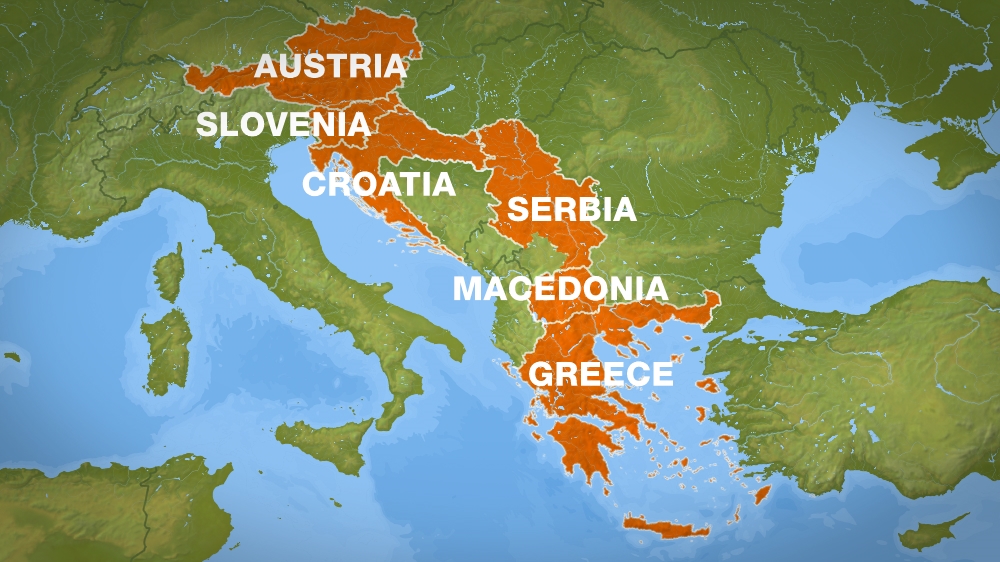UN says EU-Turkey refugee deal would violate law
Plan would be tantamount to blanket return of foreigners to third country, which is not consistent with law, UNHCR says.

Proposals to send back refugees en masse from the European Union to Turkey would contravene their right to protection under European and international law, agencies and rights groups say.
The UN’s refugee agency, UNHCR, has criticised the plans drawn up by Turkey and the EU, saying they would amount to a violation of human rights.
Keep reading
list of 4 itemsEU urges China to use influence on Russia and Iran
‘No to the Russian law!’ Georgia protesters demand a ‘European future’
Polish politicians condemn Warsaw synagogue firebombing
“The collective expulsion of foreigners is prohibited under the European Convention of Human Rights,” Vincent Cochetel, UNHCR’s Europe regional director, said in Geneva on Tuesday.
“An agreement that would be tantamount to a blanket return of any foreigners to a third country, is not consistent with European law, is not consistent with international law.”
IN PICTURES: Refugee crisis – Bottlenecked on the Balkan route
On Monday, Turkey offered to take back all refugees and migrants who cross into Europe from its soil in return for more money, faster EU membership talks and quicker visa-free travel for Turks.
EU leaders accepted the offer in principle, with Donald Tusk, European Council president, saying the deal was a “breakthrough” that sent “a very clear message that the days of irregular migration are over”.
The next step for the EU-Turkey plans involves presenting the proposals to EU leaders at a key European Council meeting on March 17 and 18.
‘Improved cooperation’
Ahmed Davutoglu, Turkey’s prime minister, reaffirmed the plan at a meeting on Tuesday with his Greek counterpart Alexis Tsipras, saying that improved cooperation would “reduce the dramatic scenes in the Aegean Sea to a minimum”.
For his part, Tsipras said intensifying cooperation was “very important”.
However, the UNHCR’s Cochetel said Europe’s commitment so far to resettle, on a voluntary basis, 20,000 refugees over two years remains “very low”.
Europe has not even fulfilled its agreement last September to relocate 66,000 refugees from Greece, redistributing only 600 to date within the 28-nation bloc, he said.
|
|
“What didn’t happen from Greece, will it happen from Turkey? We’ll see. I have some doubts,” Cochetel said on Swiss radio RTS.
Turkey hosts nearly three million Syrian refugees – the most worldwide – and has “done more than all the EU countries put together”, he said.
But its acceptance rate for refugees from Afghanistan, Iraq and Iran – at about three percent – is “very low”, Cochetel said.
Nine in 10 of those arriving in Europe each day were Syrians, Iraqis and Afghans “fleeing for their lives” who deserved international protection, he said.
“We hope that the EU member states and Turkey will come up with a balanced agreement and that this balanced agreement won’t be to the detriment of people seeking international protection.”
Before the European Council meeting later this month, “supplementary guarantees” must be put in place so that those sent back to Turkey will have their asylum requests reviewed, Cochetel said.
OPINION: The EU can learn from Turkey’s refugee experience
Speaking to Al Jazeera, Alexander Betts, director of the Refugees Studies Centre at the University of Oxford, said the plan was a set of “appalling proposals on all human rights and international legal grounds”.
He said Turkey needs “an asylum system that can guarantee the protection of refugees’ rights and the socio-economic integration of Syrian refugees” before European leaders should consider returning refugees.
Deep concerns
Several other groups have also voiced deep concerns about the plan intended to stem the flow.
Save the Children, the UK-based charity, said that in Europe, one in four asylum applicants is a child.
“Any returns of individuals who have not had their asylum applications properly considered, or who are returned to a country where they do not have the right to international protection, would be illegal under international refugee law,” it said in a statement.
READ MORE: Syrian refugees – Single mothers fight to survive
For its part, the medical charity Doctors Without Borders (MSF) said European leaders had “lost track of reality”.
|
|
Aurelie Ponthieu, MSF humanitarian affairs adviser on displacement, said: “Europe is willing to do anything, including compromising essential human rights and refugee law principles, to stem the flow of refugees and migrants.
“It is time European leaders stopped fuelling the policy-created European migration crisis and provide the only realistic and humane response: safe and legal passage and humanitarian assistance and protection to those in need.”
Bill Frelick, refugee rights director at Human Rights Watch, said: “The integrity of the EU’s asylum system, indeed the integrity of European values, is at stake.”
Meanwhile, Iverna McGowan, Amnesty International’s Europe head, doubts Turkey is a safe country to be sent to.
READ MORE: The plight of rejected Afghan asylum seekers
“By no stretch of imagination can Turkey be considered a ‘safe third country’ that the EU can cosily outsource its obligations to,” she said.
The plans have been praised by German Chancellor Angela Merkel as having the potential to hurting smugglers, a major cause of refugee deaths at sea.
Nearly 4,000 people have died while crossing the Mediterranean Sea since the start of 2015.
Merkel’s liberal refugee policy saw about 1.1 million asylum seekers arrive in 2015 alone.
 |